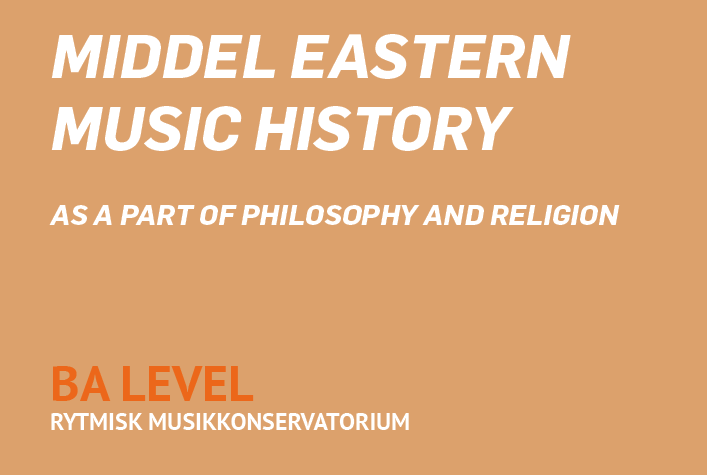
Middle Eastern Music History: Music as a part of philosophy and religion
Teacher: Nikolai Brix Vartenberg
Contact person: Lene Christensen, lc@rmc.dk
The classical music traditions of the Middle East have roots all the way back to the great civilizations of antiquity. Music has been perceived as part of philosophy, religion and even medical science. The Middle Eastern music traditions have also made an important impact on music, instrumentation and poetry in the Western world.
In this module, we will learn the different traditions and their instruments and gain insight into the cultural-historical context with which they are inextricably linked. We will also examine some of the thoughts that have been associated with music in the Middle East and look at how the Middle Eastern traditions have affected our own Western music far more than many belief. In principle, the musical tradition of the Middle East and Europe were not separate traditions.
LEVEL
BA
TIME
TBA – starts in week 35
(Not scheduled yet)
Can be on one of the following days/times:
Friday morning or afternoon
20 lessons per module
TUITION LANGUAGE
The module is offered in Danish, possible English (if needed)
ECTS
2,5
PREREQUISITES
The module does not require any specific competencies, but it will be an advantage to have an interest in the significance of music in philosophy and religion. The literature used in the module is primarily in English. It is expected that the students prepare by reading the texts to the best of their ability within the preparation time as indicated in the curriculum.
LEARNING OUTCOMES
At the end of the module the student will:
- have become acquainted with the cultural history of the Middle East with music as a starting point
- be able to distinguish the different musical traditions from each other
- have knowledge of important artists in the various traditions
- have knowledge of instrumentation in Middle Eastern music
- ability to understand the meaning of music as part of the philosophy and religion of the Middle East
- have an understanding of the influence of Middle Eastern music on European music
- ability to reflect on how cultures exchange knowledge and experience – with music as a starting point
- be able to convey an understanding of the music history of the Middle East and its ideological-historical context
CONTENTS
The topic is explored through reviews of four key themes:
- Introduction to Middle Eastern music and its instruments. Listening and demonstration of instruments
- Lecture on the cultural and ideological history of the Middle East with music as a starting point
- Text reading of selected texts by musicians and thinkers from the Middle East
- Discussion, reflection and perspective of the mentioned themes in plenary and in groups
TEACHING AND WORKING METHODS
- classes
- shorter oral presentations from the students
- reflection exercises and discussions
GROUP FORMATION
Usually, groups consist of 8-9 students
ASSESSMENT
The assessment takes place based on a reflection essay (in writing), alternatively a podcast or a video. A self-chosen topis must be explained within the framework of the module´s topics in the form of a reflection essay of 5 standard pages or a podcast/video with a duration of 10-12 minutes.
The essay must include a minimum of five source references, of which a minimum of two must be included in the source list for the module. This requirement also applies to podcasts and videos where the source list is submitted separately as a written document.
Students with a mother tongue other than Danish can submit the essay in Scandinavian or English. The essay is submitted in WISEflow before the deadline, set by the Study Administration.
The assessment is awarded: Approved/Not approved.
READING AND LISTENING REFERENCES
Examples of Literature and music:
- text excerpts from professional literature from i.a. Music and Song in Perisa, The Art of Avaz, Dr. Miller, Lloyd samt Yearbook of Traditional Music
- music by i.a. Hossein Omoumi, Parisa, Dr Dariush Safvat, Omar Yusef, Aysek Veysel, Neysen Tevfik, Mohammad Mousavi and many others
- original texts in the translation of texts from the ancient Middle East, the oldest poems, and songs from the ancient Middle East: Enheduanna’s Queen of the Powers of the World, the Gilgamesh epic and the Enuma Elish myth in addition to medieval texts by Al-Kindi, Al-Farabi, Al-Razi, Al-Ghazali and Jalāl ad-Dīn Mohammad Rūmī.
TIME
TBA – starts in week 35
(Not scheduled yet)
Can be on one of the following days/times:
Friday morning or afternoon
PLACE
Rhythmic Music Conservatory
ONLINE
NO
LEVEL
BA
ECTS
2,5
TUITION LANGUAGE
The module is offered in Danish, possible English (if needed)
REGISTRATION
If you wish to participate in one of the TVAERS courses, you need to register 1 or 2-course requests.
Before the course start, you will be notified if you can be offered a place on a module.
Registration opens on June 3rd.
The deadline for registration for the fall semester of 2022 is 17 June
You register by this link
